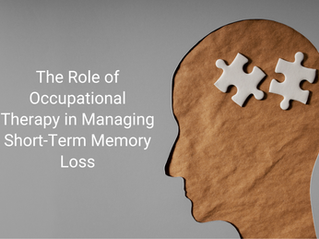Occupational Therapy with Adults
.jpg)
How can occupational therapy help adults?
Much of what defines successful or active ageing fits perfectly within the philosophy of occupational therapy; that is, the 'doing' to enable health and wellbeing. For occupational therapists, this means working well with adults to prevent ill health and disability. It could also mean working with individuals to change health-damaging practices to avoid developing a chronic or irreversible stage. With older adults, occupational therapists are actively involved in rehabilitation and assistive devices and technology to promote occupation engagement.
Here are several examples of how occupational therapists can help adults:
Pathologies as adults age:
Adults differ from children in the way they respond to illness and disability. Consequently, older people must have access to appropriate professionals who are skillful and have relevant expertise in working with adults. Occupational therapists are able to assess and evaluate how personal, social, spiritual, psychological and cultural factors impact an adult's health and wellbeing. Occupational therapists are trained to work with adults who may be negatively affected by: cancer, dementia, depression, diabetes, falls, fractures, heart failure, learning disability, musculoskeletal problems, respiratory problems, stroke and many more.

.jpg)
Active Aging for Adults: Self-Care:
A comprehensive understanding of adults' functional performance includes recognizing the importance of daily activities and how they contribute to overall health and wellbeing. Self-care activities are affected by declining cognitive function, including sensory conditions, decreased strength and agility and limited mobility. Self-care activities are daily activities that include personal care such as bathing, grooming, or dressing. These tasks are crucial to living in a social world as they enable health and create a sense of self-efficacy, leading to greater life satisfaction. Occupational therapists emphasize preserving function and helping adults by using skill training, environmental adjustments, and assistive devices to preserve self-care functions.
Adults and Driving:
Driving is a valued occupation for adults as it is a symbol of independence and freedom. Driving is a means to transport and enables adults to participate in the community's occupations, including social participation, shopping, and self-care. As adults age, driving challenges occur due to typical physiologic and disease-related changes. These changes can affect the skills necessary to drive safely and independently. Occupational therapists assess adult drivers' functions, personal factors, performance skills and patterns, and contexts required to determine if the adult driver will be safe behind the wheel. Occupational therapists can complete behind-the-wheel assessments to identify driving deficiencies and to implement possible recommendations. The psychological and social associations must be acknowledged when assessing an adult driver. Occupational therapists consider the balance between independence and safety for the driver and other road users.

What is Occupational Therapy?

Occupational therapists help people of all ages participate in the things they want and need to do through the therapeutic use of everyday activities (occupations). Occupational therapists use a client-centred approach to help overcome barriers with performance and improve quality of life
Occupational Therapy with Children

Occupational Therapists help children of all ages to achieve and maintain independence. Occupational Therapists work with children to help them in their day to day skills, known as "occupations." Learn more about how Occupational Therapists can help:
Occupational Therapy Column - An In-Depth Look
Take a look at our most recent articles about Occupational Therapy.
Subscribe for First Access to New Posts!





